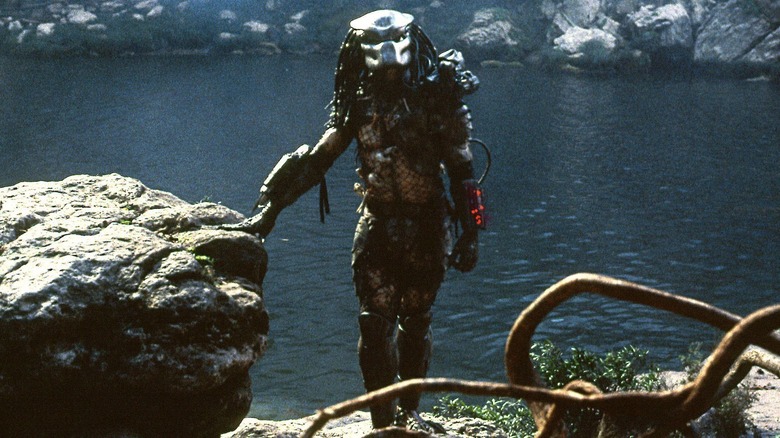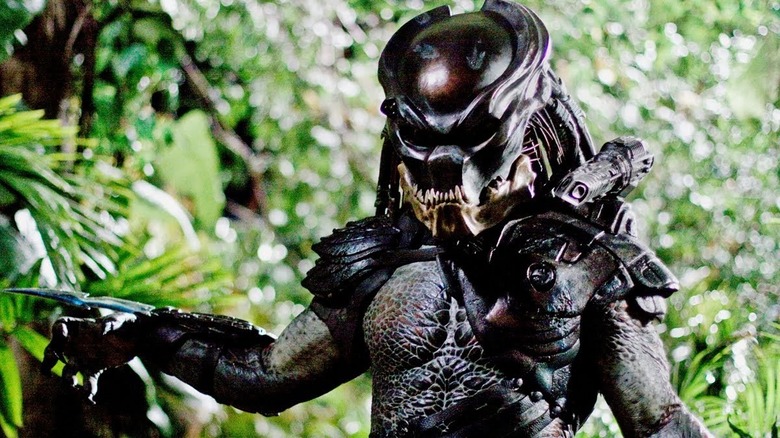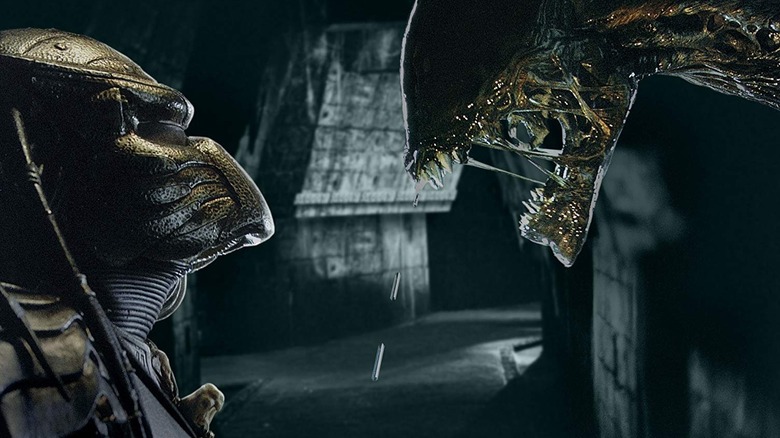The Correct Order To Watch The Predator Movies
It's not mentioned out loud in any of the movies, but the alien species in the "Predator" series is called the Yautja, pronounced "Yah-OOT-Cha." Although there have been comics and other pieces of expanded universe ephemera to explain where the Yautja come from and what their civilization might be like, the movies have depicted them merely as a species of intergalactic hunters that have arranged their entire society around the challenge of hunting for sport. They could have a rich arts community back on their homeworld, or perhaps a stirring and complicated political culture, but we've only ever seen the hunting part of their society. Perhaps the hunters are merely wealthy weekend warriors who can afford to go game hunting on other planets, while other Yaujta protest their wasteful brutality.
Throughout their multiple film appearances, the Yautja have mostly hunted humans, although there are two notorious films from the 2000s wherein they hunt the xenomorph creatures from Ridley Scott's 1979 film "Alien." In both instances, the Yautja seem to get a thrill from stalking, killing, and making trophies of the most dangerous game. They seem to have no compunction killing sentient creatures, although it can be debated as to whether or not the xenomorphs are sentient.
The first "Predator" film came in 1987. The sequels have been set in the past, present, and future. They also have a confusing titling system, as only one has an actual number attached and the others merely add definite articles or bonus S's. One can also, as many have, pair the "Predator" movies with the "Alien" movies to create a mega-marathon of alien mayhem. Let us examine the various iterations of the "Predator" film series.
The release order
Here are the "Predator" movies in straightforward chronological release:
- John McTiernan's "Predator" (1987)
- Stephen Hopkins' "Predator 2" (1990)
- Paul W.S. Anderson's "Alien vs. Predator" (2004)
- Greg and Colin Strause's "Aliens vs. Predator: Requiem" (2007)
- Nimród Antal's "Predators" (2010)
- Shane Black's "The Predator" (2018)
- Dan Trachtenberg's "Prey" (2022)
The first film takes place in the present day and is set in an unnamed South American country where over-muscled, over-armed United States badasses have been sent to rescue some sort of cabinet minister. Their ultra-masculine bluster is easily cut down by the appearance of a mysterious invisible alien that is living in the woods. It stalks the American soldiers, kills them one by one, and takes trophies from their corpses. Human manliness, "Predator" argues, is little more than theatricality. It is not a useful skill.
"Predator 2," meanwhile, is set in the near future of 1997 in a crime-riddled Los Angeles. Another Yautja creature drops into the middle of a vicious gang war and begins killing people in the big city. It seems that Yautjas like to hunt in areas torn by war, and crime has gotten so bad in L.A. that it is indistinguishable from a war zone.
Shane Black, when "The Predator" was released in 2018, said that it took place before "Predators." Black's film is set in the present, so Antal's film perhaps takes place in 2019 at the earliest. It's hard to tell, though, as "Predators" is set on a distant planet and the human characters don't make too many time-specific references. Both of the "Alien" crossovers are set in the present.
"Prey," meanwhile is set all the way back in 1719.
The historical order
If one wishes to watch the "Predator" movies in order of their historical chronology, then the following lineup should be followed:
- "Prey" (1719)
- "Predator" (1987)
- "Predator 2" (1997)
- "Alien vs. Predator" (2004)
- "Aliens vs. Predator: Requiem" (2007)
- "The Predator" (2018)
- "Predators" (2019?)
Of course, since there are "Alien" crossovers involved, it gets a little more complicated. All of the "Alien" movies are set in the future, so they won't overlap with the "Predator" films above chronology, but the "Alien" movies also feature a few prequels within their own universe, so the release order and the historical order don't exactly line up. Here is the release order of both the "Predator" and "Alien" movies.
- Ridley Scott's "Alien" (1979)
- James Cameron's "Aliens" (1986)
- John McTiernan's "Predator" (1987)
- Stephen Hopkins' "Predator 2" (1990)
- David Fincher's "Alien³" (1992)
- Jean-Pierre Jeunet's "Alien Resurrection" (1997)
- Paul W.S. Anderson's "Alien vs. Predator" (2004)
- Greg and Colin Strause's "Aliens vs. Predator: Requiem" (2007)
- Nimród Antal's "Predators" (2010)
- Ridley Scott's "Prometheus" (2012)
- Ridley Scott's "Alien: Covenant" (2017)
- Shane Black's "The Predator" (2018)
- Dan Trachtenberg's "Prey" (2022)
Although they all take place in the future, Scott's "Prometheus" and "Alien: Covenant" take place before the events of "Alien." Although not so far that they overlap with the events of any of the "Predator" movies.
Both the first "Predator" and Cameron's "Aliens" are explicitly about masculine military bluster and the powerlessness that ultra-tough, gun-toping a-holes feel in the face of an unknowable alien threat. Some critics have noted that both may also be a metaphor for American soldiers in the Vietnam War. If you don't have the time to see all 13 of the above movies, make a double feature of "Predator" and "Aliens." They're not the best movies on the list, but they pair well.
The full Alien/Predator history
Of course, if we're going to add the "Alien" movies into the mix, then we need one additional list that constructs an Alien/Predator marathon historically. Here, then, is that list:
- "Prey" (1719)
- "Predator" (1987)
- "Predator 2" (1997)
- "Alien vs. Predator" (2004)
- "Aliens vs. Predator: Requiem" (2007)
- "The Predator" (2018)
- "Predators" (2019?)
- "Prometheus" (starts in 2089, most of the action takes place in 2093)
- "Alien: Covenant" (2104)
- "Alien" (2122)
- "Aliens" (2179)
- "Alien³" (also 2179)
- "Alien Resurrection" (2381)
Oh yes, and there is a brief prologue in "Prometheus" set in prehistoric times. If you want to break out that one scene and watch it first, you may.
All told, this series covers 662 years of history. That's even more than the 331 years covered by Alan Smithee's (actually Kevin Yagher's) 1996 film "Hellraiser: Bloodline" which begins in 1796 and ends in 2127. No other multi-film series might span quite that same amount of time other than perhaps Sam Raimi's "Evil Dead" movies. Raimi's "Evil Dead" movies are set in the present, except for 1992's "Army of Darkness" which takes place around 1300. That would have the Alien/Predator marathon beat by about 30 years.
Yautja? More like Yau Oughtja see these movies!



